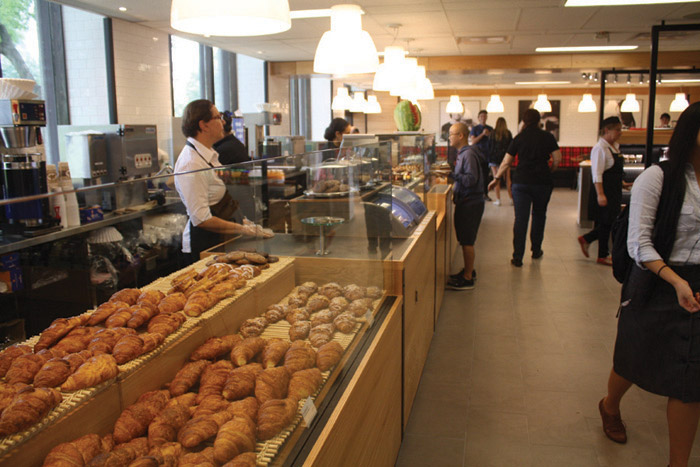Première Moisson, the new dining option in the basement of Redpath Library, has drawn mixed reactions from students since opening earlier this month. The space, formerly occupied by Tim Hortons and Pizza Pizza, has been praised for its fair trade options, but criticized for its higher costs and for the lack of student input sought out prior to its implementation.
“There are definitely some students who do like Première Moisson,” Arts Senator Jacob Greenspon said. “There’s a whole spectrum of opinions here, but I think the important thing to emphasize is that this is such a huge decision that was [made] with basically no student consultation.”
According to Mathieu Laperle, senior director of Student Housing and Hospitality Services (SHHS), the unit under which dining services falls, student input was gathered through various indirect means.
“Over the years, we did some student surveys that gave us a lot of details and information about what people would like to see on campus,” Laperle said. “Many consultations have been done in residences.”
Greenspon said that the surveys conducted did not pose explicit questions regarding changes to the Redpath library space.
“It’s much more of a general cafeteria, food services on campus survey,” Greenspon said. “There wasn’t any sort of question that asked, ‘What kind of coffee space do you want in the Redpath library?’ It was all very general.”
Library Improvement Fund Coordinator Erin Sobat agreed, noting that the survey results were more general and not concrete suggestions.
“[SHHS’s] primary metric of student consultation was their annual [food and dining services] surveys,” said Sobat. “[SHHS suggested that there was] some sort of indications in the past that students wanted quality over cost and needs to renovate the space.”
According to Students’ Society of McGill University (SSMU) VP University Affairs Claire Stewart-Kanigan, incidents that indicate a lack of consultation with students on university matters could lead to feelings of hostility between students and the university administration.
“A decision [that] comes through that students don’t like, but at least know they’ve had the chance to be consulted [on] is going to be a lot less [damaging] in terms of the admin-student relationship, than if a decision comes through and students didn’t know where it comes from,” Stewart-Kanigan said.
Other concerns expressed by student representatives pertain to the the financial accessibility of the new café.
According to Oliver DeVolpi, executive chef of SHHS’s dining services, brewed coffee at Première Moisson costs approximately 40 to 50 cents more than it did at Tim Hortons, due to the quality and ethical sourcing of the product.
“This is a fair trade cup of coffee; it’s in a compostable cup,” he said.
Laperle said that a major factor in choosing Première Moisson was that it fell in line with the university’s goals to use locally-sourced food suppliers.
“We’re more and more sustainable, we buy more and more from local suppliers,” Laperle said. “So [Première Moisson] was the perfect fit for us.”
On the other hand, Stewart-Kanigan stressed the importance of finding a balance between fairly-sourced food and fair pricing.
“Environmental sustainability does not need to be at the expense of financial sustainability,” Stewart-Kanigan said. “I feel that students could feel that that element of sustainability was not centred in this discussion. Those two things do not have to be mutually exclusive.”
Nonetheless, Laperle said that Première Moisson, in its early stages, was open to adapting to student needs in terms of menu offerings, especially due to its unfamiliarity with the university market environment.
“Depending on the company, there is some flexibility,” he said. “Première Moisson, they are very open [….] The coffee we have for the Première Moisson here is not the same as what they’re offering in other [locations] in Montreal. This is an example of their flexibility.”
Nonetheless, Stewart-Kanigan suggested that a greater effort to consult students be made before changes are set for future decisions involving student space.
“It’s beneficial for everyone if student associations are kept in the loop earlier so that we can be involved in the consultation process,” Stewart-Kanigan said. “Consultation should be an expectation, not an afterthought.”









